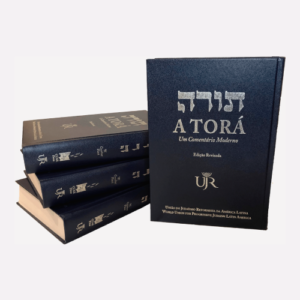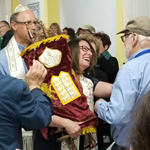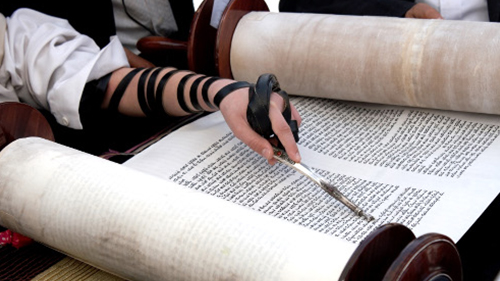Afet seven years of work, the Portuguese translation of “The Torah – A Modern Commentary”, edited by Rabbi Gunther Plaut and first published in 1981, is now available to all Reform congregations in Brazil.
On the 8th of May, 2019, Bnei Sefarad Reform congregation of Valencia, Spain celebrated with great joy and much excitement the donation of the Torah scroll written in Sephardic script, made by the congregation Shir Ami, Newtown, PA, USA.
We were once called Hebrews during the time of Abraham, Sarah, Isaac and Rebecca. After Jacob got his name changed to Israel and moved to Egypt, the people were called Israelites. This continued for the entire biblical period until Rome ruled over an area it called Judea when we were called Judeans. There were a few instances of the word Yehudim–Jews used in the Book of Esther but not enough to make it a historical reality.
When talking about this week’s Torah portion, one often finds oneself discussing the question which shouts from the pages of the Torah – “what could possess a parent to sacrifice their child”? Those who are familiar with the portion will assume that this would be in relation to the famous story of the binding of Itzhak, but on closer inspection, this week’s Torah portion actually talks of four children whose parents seemed willing to sacrifice them for some greater good.
The Torah portion this week is called Lech lecha, which, loosely translated, means get going! God commands Abram to leave his birthplace and go to a new land that God will show him. In the first three verses of this portion, (Genesis 12:1-3) the word bracha, meaning blessing, appears five times.
I am an avid reader. I enjoy most genres and love to get suggestions from my colleagues and friends. I will start a novel just because a trusted friend recommended it, without researching its topic or other reviews. I also enjoy rereading the classics. Occasionally, when rereading a story, an image or a plot twist will seem different or raise a conflict which feel new to me. When I have that reaction to the new information, I push myself to continue and figure out why.
The rabbinic conference in Columbus, Ohio 1937 must have been fraught and tense – the Reform movement in the United States was on the edge of redefining its relationship to a personal God and to Israel – and some rabbis felt that the core values of Reform Judaism were on the chopping block.
With Pesach the rain in Israel generally ends. But this past week we had quite a storm! The Hebrew language has multiple words for rain. Geshem is the most general word. Yoreh refers to the early rain. And malkosh the late rain. This week’s Torah portion, Behukotai, is one of many traditional Jewish sources that views rain as a reward to the Jewish people for obeying the commandments:
The double-portion of Tazria-Metzora (Lev 12:1 – 15:33) presents a series of ritual purity instructions for Israelite priests, starting with procedures for women who have recently given birth, and shifting to the rules priests must follow to identify, quarantine, inspect, and ultimately, readmit to the community people with an ancient skin disease called tzara’at. In my first years working with b’nai mitzvah students, I repeatedly witnessed the disappointment of kids upon learning that Tazria-Metzora was their parashah. I would try to reassure them that, with help, they really would be able to find something relevant to their lives within these verses. The cultural distance, confusion, and even revulsion that many experience when encountering these parts of Leviticus are tough to overcome. And yet, with some cultural translation and an open mind, Leviticus can teach us a lot.
[On February 14th] the town of Parkland, Florida made the news because of a school shooting that left 17 people dead—most of them teenagers. There are now about 5 such shootings each month in America. Since 20 first graders were killed in Newtown, Connecticut in 2012, there have been some 239 school shootings, taking 138 innocent lives, injuring and traumatising countless more. That is, since I’ve been with you here in Sydney, 240 school shootings have taken place in America, and many more at large public venues, like music concerts and night clubs.





